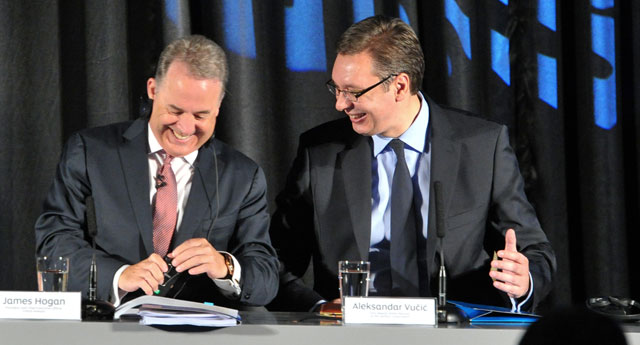A €67 Million Loss in 2014: Vucic’s Air Serbia Dream Is a Disaster
According to Air Serbia financial report for 2014, the company ended the fiscal year with a minus of 67 million Euros. In 2013, Etihad Airways signed a strategic partnership deal with the Serbian Government that led to the launch of Air Serbia. As a result, the Serbian national airline JAT Airways ceased to exist. Aleksandar Vucic, who launched, praised, and championed the deal, lied about JAT Airways annual losses. JAT worked substantially better than Air Serbia currently does. Air Serbia’s negative balance is entirely covered from the budget of Serbia. In 2014 alone, Vucic’s government has pumped 69,318,442 euros into Air Serbia.
Worse still, Air Serbia’s financial results are kept secret.
The 67 million euros loss
According to its financial report for 2014, Air Serbia ended the fiscal year with a loss of 67 million euros.
“Nobody could have ever dreamed such a good contract”, Serbian Prime minister Aleksandar Vucic claimed in August 2014.
On 1 August 2013, Etihad Airways, the second-largest airline of the UAE, signed a wide-ranging strategic partnership deal with the Serbian government that led to the launch of a new carrier, Air Serbia, and to the end of old JAT Airways. After almost 70 years in service, the national flag carrier of Serbia, once a major European airline, ceased to exist.
Under the agreement, Etihad acquired a 49% stake in the new company and management rights for a period of five years. Etihad and Serbian government were supposed to invest 40 million dollars each into the new company. The parties also agreed to provide further funding of up to 60 million dollars each.
The 70 million euros in government subsidies
It was supposed to be a “major investment deal”, “a profitable company” and “a leading airline in the region.” Praising the privatization, PM Vucic said his government expects Air Serbia to become a profitable company within a year. As a result, in March 2015, Air Serbia announced in a press release a net profit of 2.7 million euro for 2014.
It was a clearly fabricated piece of data meant to be exploited by the Vucic government and the SNS. The so-called profit was in fact the result of a direct Serbian government intervention. There is a column in Air Serbia’s 2014 financial report titled “Income from Subsidies, Grants, and Donations”. According to the data, Air Serbia’s negative balance is entirely covered from the budget of Serbia. In just a year, Vucic’s government has pumped 69,318,442 euros into Air Serbia.
In fact the 40 million dollars promised by Etihad were not an investment but a credit note guaranteed by the Government of Serbia. According to the agreement, during 2017 Etihad has to absorb the proportional part of business losses (49%). If the UAE-based company decides to abandon the Air Serbia project, the Serbian people will have to pay up the 40 million dollars.
Vucic’s lies and Air Serbia’s secrets
Back in 2014, when he claimed Air Serbia was more than a dream, Vucic also said that “all Serbian cabinets have been faced with JAT Airways annual losses of around 35 million euros.”
It was a lie. The old JAT Airways in its entire history worked substantially better than Air Serbia currently does. The 67 million euros loss in 2014 was much worse than any business year of JAT Airways earlier. Before ceasing to exist in 2013, JAT reported a loss of 7 million euros in 2009, 25.6 million euro in 2010, 30.4 million euros in 2011 and 32.6 million in 2012.
Air Serbia has no public financial statements. Its 2014 financial report isknown only to a handful of persons. Both the company and the Serbian Business Registers Agency (SBRA) are in violation of the Serbian law when it comes to the obligation of publishing annual financial reports within a legal timeframe. Not a single national body has reacted to this situation.
On both Air Serbia’s and SBRA’s official web pages the last published financial statement is the JAT Airways report for 2013.
“The new face of Serbia” looks bleak
The Air Serbia contract was part of the Vucic-UAE arrangement. So it was Aleksandar Vucic himself who publicly launched the Serbian Government partnership with Etihad. On 1 August 2013, standing next to James Hogan, the Etihad Airways president and chief executive officer, Vucic announced: “We made something that will become a new face and a new start for our country, something we will be proud of.” (Incidentally, James Hogan was also a personal friend of Vucic’ lobbyist, Lord Timothy Bell, founder of Bell Pottinger.)
What will happen to Air Serbia in 2017? According to the agreement signed between the Serbian Government and Etihad, the company can count on state aid and subsidies until 31 December 2016. Will Etihad try to avoid absorbing half of Air Serbia huge losses? Will Air Serbia go bankrupt?
Serbia’s Prime Minister and presidential candidate Aleksandar Vucic is the only one who can answer these legitimate questions. James Hogan, the other artisan of the Air Serbia deal, got fired from Etihad at the beginning of this year because of “poor business results.”










Trackbacks and Pingbacks